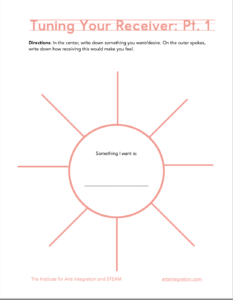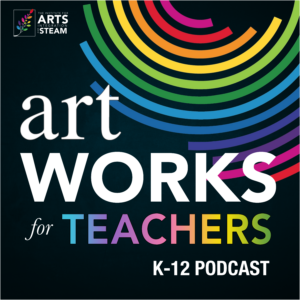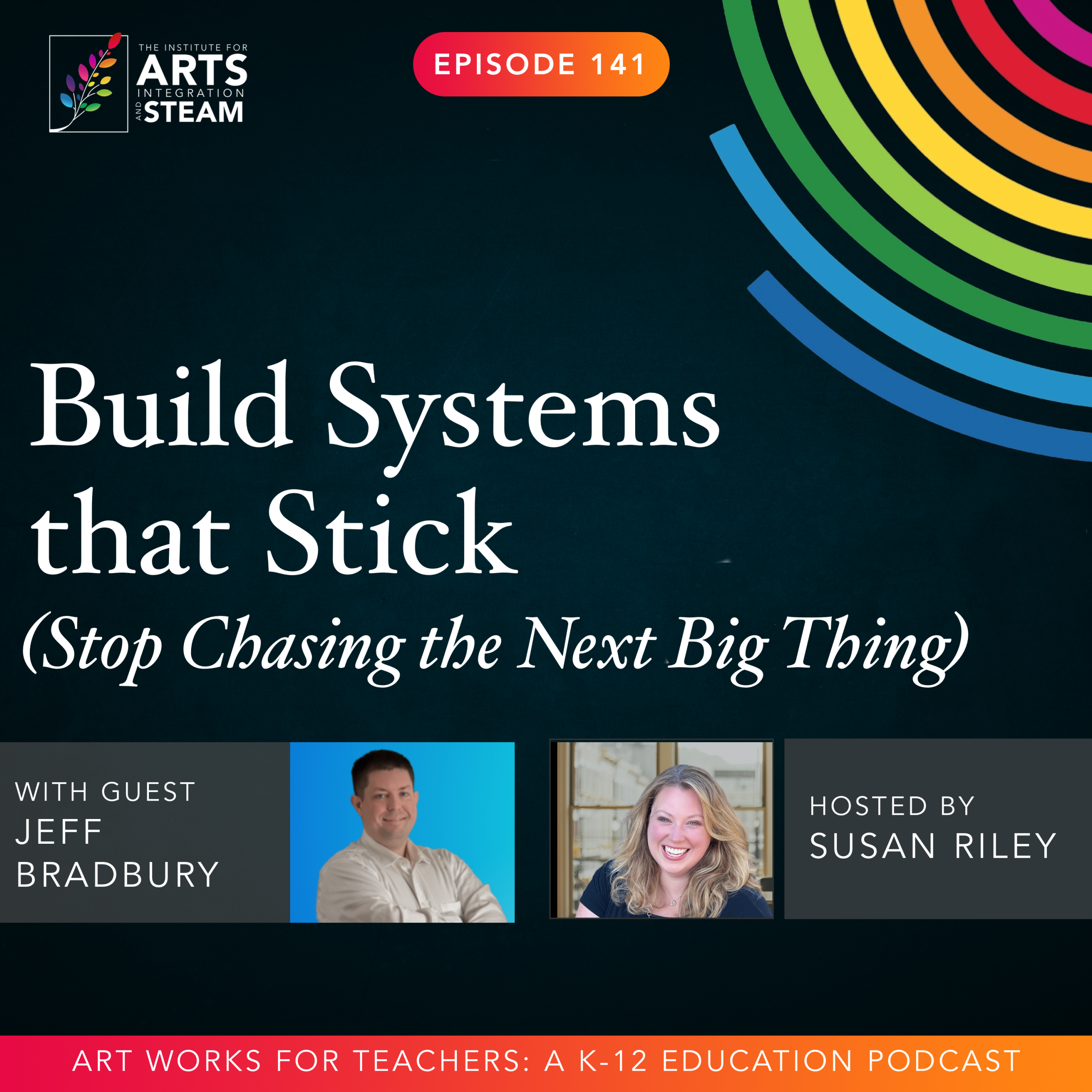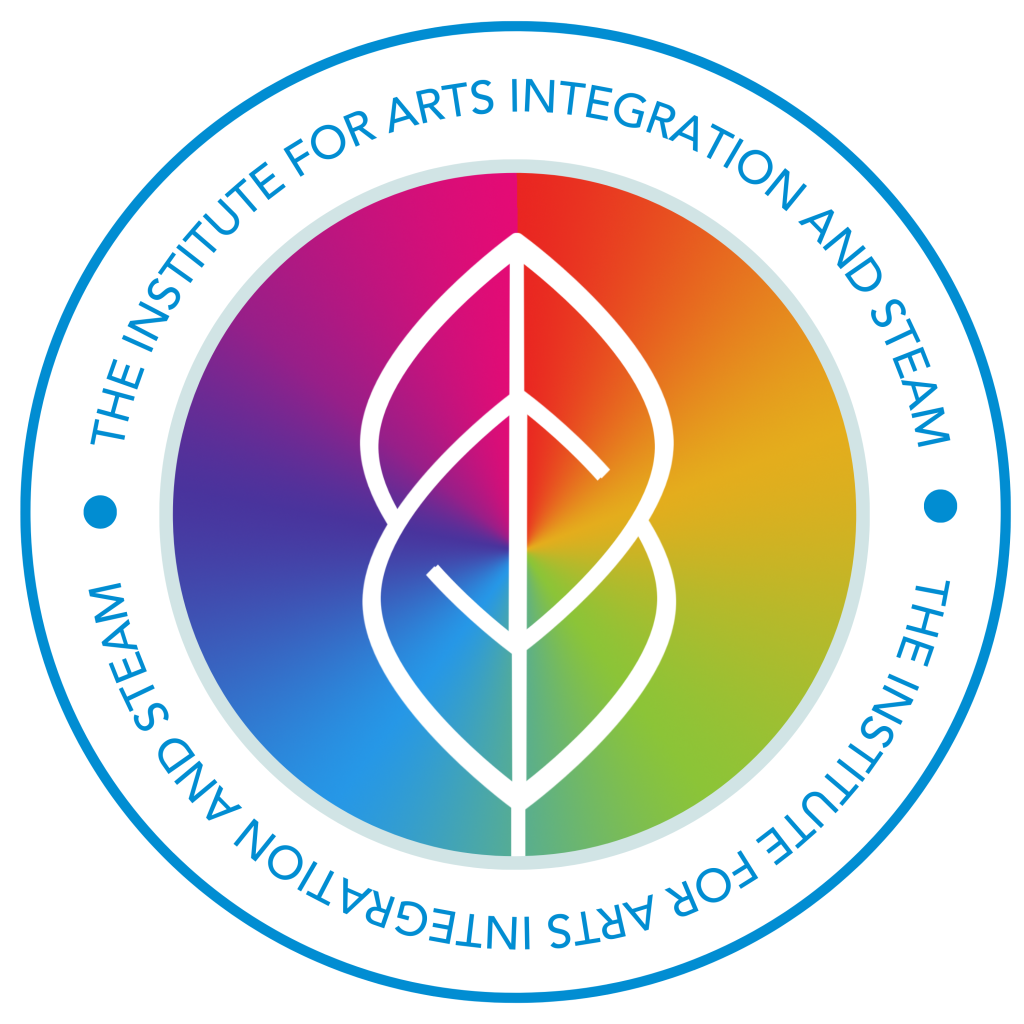ART WORKS FOR TEACHERS PODCAST | EPISODE 045 | 36:36 MIN
Achieving vs Receiving
Enjoy this free download of the Tuning Your Receiver activity.
And so this episode might be a little different, but I think you’re really gonna enjoy it because as far as I’m concerned, oftentimes when we focus on our mindset and we bring ourselves back to that core basic understanding of who we are, so much of the stuff that has been putting pressure on us kind of fades into the background and things become much more clear in terms of what we need to focus on and what we can let go of. And so I’m hoping that this episode will serve you in that way, in the same way that it has served me in preparing it. So let’s get into it. Let’s talk about it.
Now, here’s the thing. Over the last, oh, I don’t know, decade or so in education, the big buzzword has, for me, at least that I have found over and over and over again, is student achievement. And as the type A student in school herself, that makes sense to me, right? That we’re trying to help students achieve in whatever way that looks for them, right? Some students achieve by scoring great grades, some students achieve on the soccer field, some students achieve on the stage, right? So it’s not about necessarily academic achievement, but the idea that we are achieving individuals. And I think at our core, a lot of us fall into this and because our society does this, right? That we keep track of how we move through the world by our achievements, right? I don’t know about you, but I’m at a point in my life where I’ve hit that midlife stage and I have not been on any 40 under 40, 50 under 50, 30 under 30 list, right? I haven’t received a lot of big name awards that you go to gallows for. And if you have, I’m so excited for you. That’s awesome and I will cheer you on all the time. But if you have not and you’re in the same situation that I’m in, you know, sometimes it feels like, am I doing enough? Have I achieved enough? Particularly with the rise of social media, this has gotten much more prevalent, right? The idea of achievement and sharing our achievements and constantly striving for more. And so as I’m thinking about our students and about teaching and the profession that we’re in education, this idea of achievement is a two edged sword, right? I have always been a high achiever.
I have always been someone who gets the A, and if I don’t get the A, I wanna know why I didn’t get the A. So if I know why I didn’t get the A, I wanna know is there an opportunity for extra credit so that I can get the A, right? It is constantly striving for more, constantly achieving more. And so the flip side of achieving, I think, the more I’ve been alive, the more that my experiences have unfolded. For me, the flip side of achievement is receiving, is being in a mode where I’m not striving, I am open to receiving whatever it is that the world has to offer, right? Um, that is very, very difficult for me.
There’s guilt behind it and we’re gonna dive into that in a little bit. But there’s also the idea that I didn’t work hard enough for it so I didn’t earn it. There’s so much wrapped up in that right and so for me I wanted to investigate What is this because I feel like? The achievement itself if all we’re looking for is achievement, it is one of the worst barometers for how we live a life. Not only that, but it can do some serious damage to us as individuals, to our mindsets, to our children. And so I wanna know if there’s a better pathway out there, let’s investigate it, let’s see, can we be open to it? What are the roadblocks to it? And how do we overcome those so that we can be maybe healthier versions of ourselves and maybe available a little bit to an open to not having to be so overachievement driven. So I think a lot of this comes down to the idea of identity, who we identify ourselves as, right? Do we identify ourselves by our achievements? And it’s really interesting because when I look at my daughter and we are having these college conversations now, we’re at this point where she’s a teenager and we’re having these college conversations. She is having such a difficult time, number one, narrowing down options. I think that’s normal, but also trying to figure out who she wants to be because in her mind she has decided that she needs to achieve something great.
She doesn’t know what it is yet, but she has to do something great. And so she puts this pressure upon herself to achieve whatever this is. But the problem is she doesn’t know what it is. She doesn’t have a barometer of like, here are the metrics to get me to where I wanna go. All she knows is that she feels like she has to achieve. Now we’re gonna, we break that down as a family, right? And there’s lots of questions that I have for her on, where did that come from? How do we, you know, why do you feel that way, et cetera. But I think if we look at ourselves, don’t we do the same things, especially as educators? I mean, there are simple examples when we go onto social media. You know, the compare schlager that we take a hit of every couple of seconds when we’re scrolling and we’re seeing teachers whose, you know, spaces are just wildly beautiful or they’re so organized.
And I could never be that organized or they, you know, they have such a talent for whatever this is and it’s being shared, right? And so we’re constantly scrolling, take another shot, take another shot of that comparison logger. And it hurts, right? It hurts, especially if you are an achiever because you feel like you’re now behind, right? So there’s the comparisons that we make when we’re trying to achieve. Because who sets the bar? Who sets the bar for achievement? Who says that in order for you to be a success, you have to hit this metric and this metric and this metric as an educator? Who says? And yet we are all running on this treadmill that goes nowhere of achieve, achieve for what?
This is like this is what keeps boggling my mind especially as I continue to be in this achievement thing I find myself striving to achieve for goals that I’ve set for myself which are great um but where did those goals come from that’s the part that I have to start to question and if you’re in the achievement zone where you’re constantly achieving this now becomes your identity
So it’s really hard to let go of the achievement, you know, pull because this is how we identify ourselves. I am an achiever, right? I achieve these things. I overachieve. I’m the one you can count on. I’m the one who’s gonna go above and beyond. I’m the one who’s gonna put in the extra hours, right? Because that’s how I now self identify. And this, my friends, is where I have found it gets really dangerous. Particularly, and I’ll just use myself as an example, I feel very strongly that sometimes, and many times, our outsides share what our insides don’t want you to know. Our outsides share what our insides don’t want you to know.
I have seen this in myself, I’ve seen it in family members, I’ve seen it in friends of mine that, you know, I so want to achieve for you that I’m gonna put in 50, 60 hours worth of work in front of a computer screen. And I’m not gonna stand up because I wanna make sure that everything, you know, that I put in the hours and that I have produced for you this perfect thing that you can celebrate, right?
And in doing so, I have sacrificed my health, I have sacrificed my wellbeing, I don’t remember what it is to have extra time anymore. It’s one of the dangers, it’s so funny. We are onboarding a new employee this month. I love her. She was a teacher in the field and is now part of our team as a success manager for other schools in transforming their arts integration efforts. It’s amazing. But our entire team told her, make sure that you take time for yourself. Make sure that you go for that walk in the morning. Make sure that you plan for breaks and you get up and take them. Because many of us on our team have fallen into this achievement trap. And we don’t like the way that we look right now because we are overweight or we don’t like that we can’t move the way that we did before because we have sacrificed the things we loved in order to achieve. And so we recognize that in ourselves.
It’s a goal for our organization that we break out of this pattern, which is one of the reasons that I’m sharing this podcast today. I think it’s so important. I think it’s a trap that many of us fall into. If you are an educator who is looking for another position, or if you’re looking to change within your district, and even if it’s moving to central office, I can tell you, your outside will indicate what your inside does not want people to know, and it will happen fast. And so you want to make sure that you try to stay as balanced as possible. And so what I’ve had to understand and unpack for myself is that we cannot out achieve our peers and more importantly, we cannot out achieve ourselves because no amount of achievement or work will make you worthy, full stop. No amount of achievement is going to make you worthy because you are worthy in and of yourself. And this is the big trap. This is the lie that we’ve all bought into. Those of us who put in the extra hours at work who make the, I’m going to call it an excuse even though it doesn’t feel like an excuse, it feels like a mandate.
We have bought into the excuse that we have to commit to extra hours after school, extra hours on the weekend, extra hours otherwise it’s not going to get done and this and that and all of the things right? Is there a portion of that is true maybe? A very small nugget of that yes. But I believe that many of us who are overachievers, and I’m speaking from my experience, I believe that we cultivate situations where we have to work more in order to prove that we are worthy, in order to prove that we are the best, that we are the overachievers, we are the ones you can count on, right?
And the hard part to understand is that no amount of work is going to make you worthy because you are worthy in and of yourself. So that leads us then to the flip side, which is receiving. Now, my mom is old school, like comes from a farm family, Germanic background, so is my dad. And I grew up with the understanding that you can’t be lazy. You can’t lay around all day and Netflix whatever and or sit by the pool all day and recharge. That’s what Sundays are for in church. Nope, every other day you better be using it to the fullest and otherwise you’re just lazy. This is the this is what I grew up listening to and I know many of you probably have heard something similar. You know, what did you do today?
Even still, you know, my mom will come over for coffee on Thursdays and she will ask me, what did you do this week? And I feel like if I don’t have a litany, if I don’t have a list of all the great things that I did this week, if I were to tell her, well, I gave myself two hours to recharge on Monday and I was just doing some painting, it’s not going to amount to anything, but I loved it. She would look at me like I had three heads because that’s a waste of time, quote unquote, right?
Can you relate to that? You know, if that is something that you grew up with as well, this is deeply ingrained in us, right? And so originally, I thought that the flip side of achievement was laziness, right, was just not doing anything and being lazy. But what I realized was that the actual flip side for me is receiving. The idea that I don’t have to do anything because I am worthy in and of myself and being open to receiving whatever opportunities are put in front of me and then of course working in those opportunities right.
I’m not advocating for laziness but I am saying being open to receiving that job connection that somebody else might have or that have made for me right that I didn’t have to work at I just it kind of landed in my lap or that extra income that just happened to fall into our family, right? Being open to receiving it and not necessarily having to work in order to receive that I can receive just because I’m worthy to receive it.
You know what that does for me? Brings up a lot of guilt. It brings up a lot of guilt. Like I didn’t work for this. I didn’t earn this. I didn’t do something in order to, you know, receive this other thing of the equal or lesser value. You know what I’m saying? And this is a huge trap that I have had to work at unpacking for a long time. And I think, it’s one of the reasons that we are in burnout mode. Certainly there are a lot of other factors, particularly in the last few years. Classroom management, kids are not the same and we’re working on trying to shift classroom management. What does that look like? Starting from ground zero there, working through trauma, looking at the public perception of education and having to deal with that, looking at low pay. There’s so many factors, of course, that are leading to burnout.
But I think a huge one is this overachievement wheel that we constantly are on, right? And because if we were to stop that and we’re just to do our jobs and just to sit in the moment of teaching and not feeling like we have to give and give and give and do every little thing, but instead sit in the moment of teaching and appreciate that moment and receive that moment for what it is, if we were to take a breath and take that in, that would give us a little peace, a little breathing room. It would allow us to let go of just a little of that cortisol and a little of that stress.
But it also can come with a huge sense of guilt that we didn’t earn something. And so here’s the work that we need to do, my friends. We need to shift this thought process from achieving to receiving and having this balance. I’m not saying that we shouldn’t achieve it all. I’m saying let’s set up what success and achievement looks like for you, not you in comparison to someone else.
Right? That has been the biggest shift for me in the mindset piece. I am tired of trying to chase the never-ending achievement wheel. But I love achieving for myself. So I set up those boundaries for me. What does achievement look like for me now? And then what can I let go of and just receive in gratefulness?
Whether it’s a moment where I stop and I stop thinking about all the other things that I have to do and just be present in the moment and enjoy that. I can receive that without feeling guilty, right? So it’s considering how do we reframe this for ourselves? What’s interesting to me is that as an artist, as my background, as many of you know, is as a music educator and I graduated from Westminster Choir College, which is one of the premier music conservatories in the world. And I had these amazing opportunities to perform with the New York Philharmonic and the Philadelphia Orchestra and so many other professional organizations. And almost every conductor I ever had in any of those moments, the biggest job for that conductor was to get us as a choir or us as the soloists to release, to relax, to allow the moment to happen rather than trying to control it and achieve a bigger better sound, right? When you think of a music conservatory oftentimes or any other performing organization, there’s a lot of competition, right? And so you’re constantly trying to achieve, be better, be more, be more, be more.
But there comes a moment where the art itself comes out of you, and in that gift also comes the gift of receiving back the joy of being able to give that gift. It is a beautiful cycle. And so one of the things that I have found that allows me to practice receiving more is participating in art for art’s sake.
I’ve been so fortunate this summer to be able to travel quite a bit to present on arts integration and STEAM around the country. And one of the pieces of research that I share a lot is that exposure to the arts, any art form, anything you want, just exposure, two times a week is enough to significantly impact our health and well-being. Just exposure. You don’t have to be perfect at it. You don’t have to be in a professional organization for it. You could just go to the art gallery for an hour. You could go and listen to some of your favorite pieces of music or go watch a musical. Two times a week is enough to allow us to get into that cycle of receive and gift, receive and gift, receive and gift. We get off the achievement treadmill and we get back to ourselves, right? We relax, we let go, we receive.
So, something that somebody told me recently, which has been really helpful for me, is this idea of a receiver. The power of receiving is in acknowledging that there is a lot of opportunity, a lot of space for us to just be all around us. We just don’t see it. So, here’s how it was explained to me. Imagine that you are in a room, wherever you are, wherever you are right now, if you’re in your car, if you’re doing laundry in the bedroom, whatever. But whatever space that you’re in, there are waves of sound that are happening around you. And then if you had a dial that you could tune it to as a receiver, you could hear, you know, a top 40 piece of music right now. Or you could hear a baseball game being shared right now. Or you could hear, I don’t know, a country song right now, right? But it all depends on where you turn the dial. And it doesn’t matter if you have a receiver in the room or not, the music’s still there. You see what I’m saying? It’s wild to think about, right? But if you were just sitting here, you wouldn’t hear any music at all. But if you brought in a tuner and you turned it on and you turned the dial, you would pick up a musical station, right, which is transmitting that sound right now in front of us. So all we have to do is figure out how do we tune into whatever it is that we want to receive. If we want more peace, how do we tune into that? If we want more joy and less burnout and less stress, how do we tune into that? What’s that station? And here’s the tricky part. That station is individual to you. So what works for me may or may not work for you.
So this is where the work lies, right? In our mindsets is figuring out for ourselves, where’s the dial that I need to tune into in order to feel what it is that I wanna feel. So I wanna walk you through an exercise that I’ve done this summer, that’s been super helpful for me. And then I’m gonna share an experience that’s going on right now that you can still be a part of. So here’s the exercise. So if you’re driving a car, don’t do this exercise, just visualize it.
If you have paper and pencil available, go grab it. All right, so on that piece of paper, whatever it is in front of you, I’m gonna use Post-it Note because it’s what I’ve got in front of me right now. Doesn’t have to be fancy. You’re gonna draw a circle, okay? And on that circle, you’re gonna write in the center something that you want, okay? Something that you’re craving. So for me, I’m gonna write down weekends free from work. I don’t wanna work on the weekends anymore. Okay, so I’m gonna put that in there. And then you’re gonna draw some spokes out of this circle, kind of like a sun, okay? And on each of these spokes, I want you to write how that would make you feel. So whatever it is that you wrote in the center, if you wrote, and I want you to be thinking about what it is something truly that you want that you feel like, Oh my gosh, if I just had that thing, it would make me feel like this. It would feel so good. Right. If I just had this one thing, you know, maybe if I put a hot tub in the backyard, maybe if I pay whatever it is, um, for me, I’m using as an example, weekends free from work. How would that make you feel? Okay. So for me, I’m going to put like, that would make me feel more present with family. That would make me feel relief.
That would make me feel peace. That would, if I didn’t have to work on the weekends, that would bring me some joy. I would be more creative.
Okay? Anything that you think about, just put it around the spokes. Okay, then flip that piece of paper over. And on the other side, I want you to draw a line from top to bottom. Okay? And on the left side, I want you to write down everything that’s preventing you from having that thing that was in the center. So what are the things that are preventing me from having weekends free from work? Right?
So I have to work hard. I have to show that I’m working hard, right? In order to love my job. I have to get it, I have to work on weekends in order to get everything done.
So write down everything you can think of that’s preventing you from having that thing on the left side.
What that is, is your amygdala, your ego, whatever it is that you wanna call it in your brain, that’s hijacking yourself right now, and saying, no, you need to be in control, you need to achieve, you need to, if you don’t do these, my gosh, if I don’t work on the weekends, what’s that gonna say about me? What is my principal gonna say if I’m not like working on the weekends and showing that I’m putting in the extra effort? What would that mean about myself?
See what your brain can do to you? It’s not good. On the right side then, I want you to write down everything that your inner truth tells you about that thing. If you get really, really quiet, there is a space inside of all of us, I truly believe this, that if you get quiet enough and you ask yourself about the thing, the core thing that you want, what does that inner truth, that inner wisdom tell you about it?
Right? I can take weekends off.
I can learn strategies to prioritize the work that I need to prioritize. I can let some things go. Ooh, that was a big one. Just thinking about that one gave me a sense of relief.
So you tap into your inner self, in your wisdom, whatever it is that’s inside of you, that truth spot, and write those things down.
Okay, because what that’s gonna tell you is that when you look at that list, the left side is just gonna look like a toddler who’s thrown a tantrum.
And so focus on the right side and all of the feelings that you would feel if you had that one thing and then work towards that one thing. Maybe that one thing is just having 30 minutes to yourself without anybody else, just quiet. Wouldn’t that be amazing?
So considering that exercise, that’s gonna be on the show notes. If you go to artsintegration.com forward slash artworks and just look for today’s episode on achieving versus receiving. If you go in there, you’ll be able to download a worksheet that will guide you through that exercise so that you can do it on your own anytime you want. What I have found about that exercise is that, first of all, it gives me a lot of peace.
Even if I can’t implement the things that I have on there right away, gives me a sense of relief and peace because I know that I can figure it out. Too, sometimes that list opens my eyes to some things that I had not been looking at and that I needed to see. And I think this is where this mindset shift, this work that we’ve been talking about in this episode is so valuable because if you come back to it and you think about,
If I could have anything that I wanted, if I could have anything that I wanted, what would it be? With no strings attached, fully receiving. What would it be and how would it make me feel? You could do this in regards to work. You can do it in regards to your personal life. There are so many ways that this exercise can be valuable. But what’s interesting to me is not what you put in the center. Whatever it is that you want, I don’t care. The thing that’s interesting that I want you to pay attention to
is how does that make you feel? How does receiving that and being open to receiving that make you feel? And if it makes you feel guilty, or if you think of all the ways that you could achieve in order to get that thing, we have some work to do, friend. Right? Because you’re addicted to achievement, just like me. And we gotta unpack that because it’s not gonna get us very far. It’s only gonna drown us in more work, more stress, more time away from our families.
The more open we are to receiving, the more we get to play with things like the arts. The more that we know I can cultivate this time for myself and being able to be open to appreciating this and not feeling like it’s a waste of time or that I should be doing something different, right? Should is such a terrible word, right? So this is where I wanna invite you in. We currently have a free course happening right now called
It’s happening for our newsletter subscribers. I would love for you to join our newsletter so that you can access this free course. The easiest way to access our newsletter is just go to artsintegration.com. Scroll to the bottom of any page and it will invite you to our newsletter. So all you have to do is just put your name and email address in and you can be, you can join us on our newsletter. You’ll get a fun little subscription toolkit as a thank you but you’ll also be invited then to this free course over the summer called Creative Renewal. And what this is, is it’s just meant for us to play. We have hundreds of people in here right now who are literally just looking at each of the different art forms, art, music, theater, dance, and watching some fun ways to play with these artistic tools. So we have body percussion demos or around demos like singing it around or lots of different ways to song write for the music portion and all you have to do is just watch and then play experiment with it on your own. Nobody is watching nobody is counting it’s literally just an experience for us to play with each of the art forms to get back to that feeling of renewal and relief and creativity and tap into that, that is just a natural part of us. And there are so many people who are doing this and just feeling so happy, so joyful at the end of their artistic experience. And you can mix and match, there’s no right or wrong way to go through it. It’s literally just four sections and you get to experience and play with different art forms in lots of different ways. So I’d love to invite you to experience that with us, especially as we’re…
getting to the end of the summer months, I really want you to come back to school refreshed and renewed, and creativity is such a great way to do that. So again, in order to access that, come on over to artsintegration.com, go to the end of any page, the bottom of any page, and just type in your name and email address in the box provided, and you’ll be able to join our email list and be a part of that creative renewal course. I hope that today, while it was not as tactical and step-by-step as
Some of our other episodes are. I hope it at least encouraged you to think about some things and maybe think about ways that we could get more in balance ourselves because you deserve it. We are all worthy of it, right? So I thank you for coming along on today’s journey. Next week, I will be back with a new interview, a new guest, and I can’t wait to introduce you to them. So.
I will see you next week, same time, same station everybody. Thanks so much. Bye for now.









